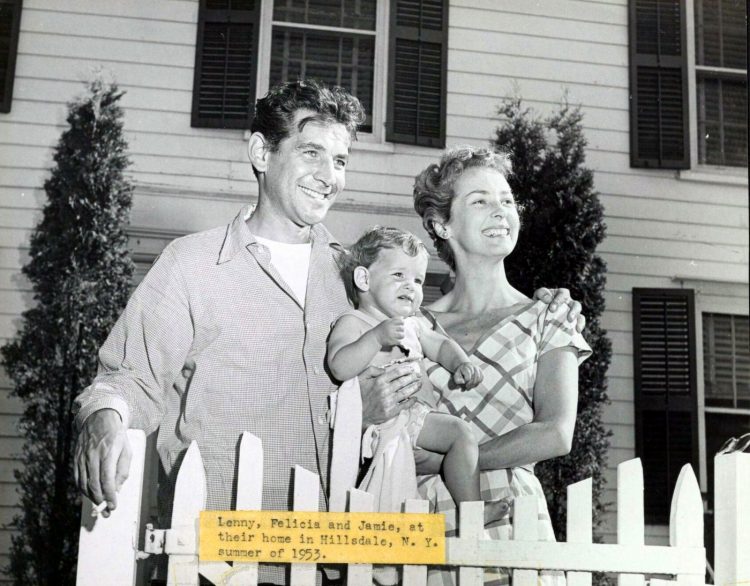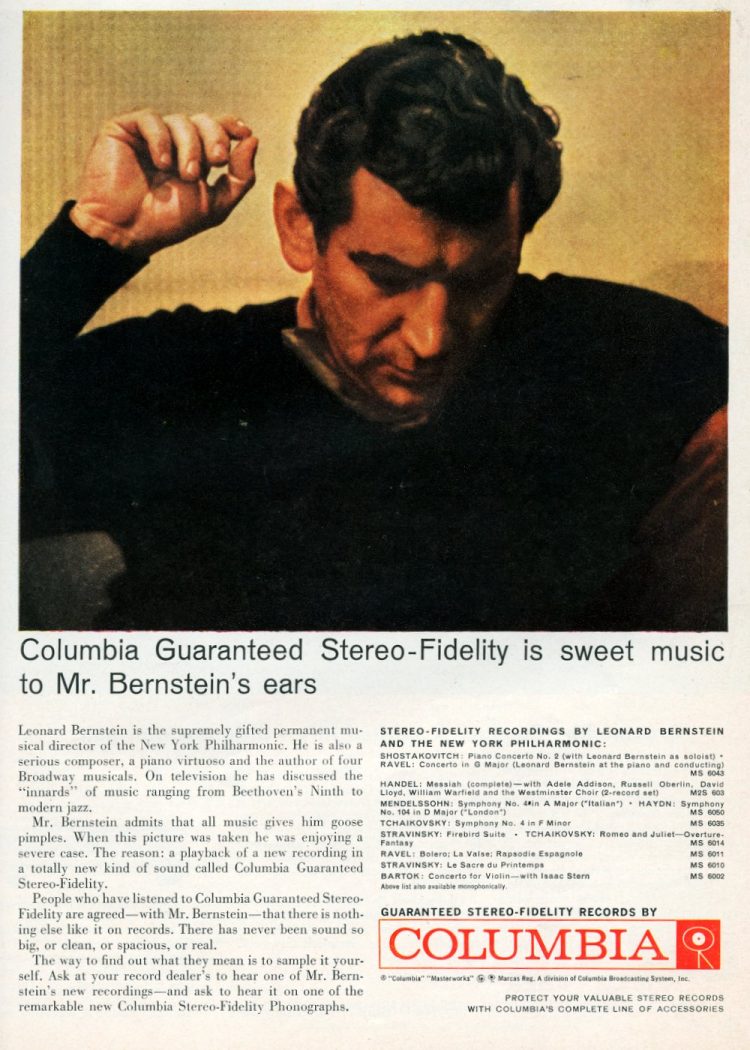Bernstein, born in 1918, demonstrated exceptional musical prowess early on. His rigorous training at the Curtis Institute of Music set the stage for a career marked by notable achievements.
As the conductor of the New York Philharmonic, Bernstein reached the pinnacle of his profession. His body of work, including the iconic score of West Side Story and his profound symphonies, showcased his unique ability to communicate complex emotions through music. Bernstein was a visionary who used his craft to connect with people and engage with significant social issues.
Bernstein’s approach to music was groundbreaking. He was passionate about making classical music accessible to a wider audience, which he achieved through innovative television series aimed at young people and other initiatives.
Below, we’ve gathered a vintage profile originally published in 1957 as well as photographs that shine a light on Bernstein’s remarkable career.

Lennie’s Story: How Hub Prodigy, Leonard Bernstein, became “Nation’s No. 1 Musician.”
What kind of man, husband and father is Boston’s musical genius, Leonard Bernstein?
When Bernstein became the first American-born and American-educated musical director of the New York Philharmonic last week, Globe man John Wm. Riley went to New York to find out. Here is his story.
By John Wm. Riley – The Boston Globe (Mass.) November 24, 1957
Bernstein’s engaging, friendly little daughter wanted to know why a reporter was calling. But then her brother Alexander, a tiny miniature amalgam of his father and mother, Chilean-born actress Felicia Montealegre, came up smiling, put his hand in the reporter’s hand as if to call him off to play.
NEW YORK, Nov. 23 — The door to the Leonard Bernstein apartment, in a building across the corner from Carnegie Hall, was opened not by a servant, but by a pretty little 5-year-old, who said: “Who are you?”

But with business at hand, Miss Helen Coates Bernstein’s secretary asked the two to go upstairs and they went, turning to smile as they passed through the door.
Miss Coates, formerly of Boston, was a teacher for many years. “I think it is unique in musical history,” said Miss Coates, “for a teacher to become so closely associated later in the career of a great musician; it has been fascinating to watch the growth and development; it amazes me. Why, you know, its nearly 25 years.”
Bernstein himself was not available, Miss Coates explained, that he had sustained some time ago a mild back wrench and had been ordered to bed and rest by both family and doctor. At several recent concerts, he has conducted from a chair.
The friends of the 30-year-old Bostonian who became musical director of the New York Philharmonic Orchestra last week, had plenty to say about him.
“Certainly the most gifted all-around musician in our country today,” said Aaron Copland, America’s most noted, native-born composer.
- Bernstein, Jamie (Author)
- English (Publication Language)
- 400 Pages - 05/13/2019 (Publication Date) - HarperPb (Publisher)
“It’s a wonder of nature,” said Charles Munch, Boston Symphony conductor. “I am very happy that this important trust has been given him… It will be of great importance to the musical life of New York and of America.”
“Dr. Koussevitzky always wanted hen to have responsibility,” said Mrs. Serge Koussevitzky, widow of the Boston Symphony’s late music director, and the man who earlier had said: “The boy is a new Koussevitzky, a reincarnation.”
Bernstein’s mentor went on to encourage and promote a career that is unique in American music.

“This is just what Dr. Koussevitzky would like Leonard to do,” Mrs. Koussevitzky continued, ”and it is a great credit to the Philharmonic that they have explored all the possibilities of Europe and America, before they came to Bernstein.”
How does Bernstein accomplish so much?
“He, above anyone else, is a shining example of both talent and discipline, observed Samuel Krachmalnick, 31-year-old conductor, sometime pupil, and very close friend of Bernstein.
Yet Lennie, as his intimates call him, always has time to help those he believes in.
Says Krachmalnick, who conducted the ”Saint of Bleecker Street” in the Boston Arts Festival two seasons ago, “My career, and my wife’s, have been given their chief impetus by Lennie’s unrelenting help.”
Krachmalnick’s wife is the gifted young mezzo-soprano, Gloria Lane, now singing in Germany.
ALSO SEE: See what made Lawrence Welk into a multi-million selling bandleader of the ’50s & ’60s
A later call at the Bernstein apartment revealed some of the secrets of Leonard Bernstein’s strength. Its the warmth, the excitement, the cohesiveness of a family unit that helps give purpose to any man’s life; above all, one of great talent.
Unlike many of the past, he is not alone in the world. Mrs Bernstein, trim, slim, New Yorkish, but with a glow in her eyes, welcomes the visitor, while holding aside her two youngsters. ‘Please come in and sit down,” she said.
Alexander — barely 2 years old — asked, “Cigarette?” and handed one from the box on the coffee table. Then, “Here, come let me fix your mussy hair,” said Mrs. Bernstein to her son.
Alexander and Jamie wanted to play. They climbed into mother’s chair. But it was time for supper, and off they went in the company of one of the household’s Chilean maids.

When the decoration of the rooms was admired, Mrs. Bernstein said, “Yes, it is nice. I love my home. We are looking for a place in the country, a place to go to.
“We can’t stay there all the time. Then we would be living without father, and that’s not good for us or for him. He loves his children and needs them so much.”
What of her own career as an actress, a career with its own shining light in the legitimate theater and on TV.
“I am not so ambitious anymore,” she said. “Life is too exciting here as it is. But there may be an occasional television show in New York, or a short run engagement.
- Electrifying conductor, brilliant composer, gifted pianist, inspiring teacher: Leonard Bernstein is one of the most famous and influential musicians of all time
- Audio CD – Audiobook
- German (Publication Language)
“I would be lost in a big hit — just couldn’t do it, for a long run.”
How is Lennie before a concert? Nervous?
“Seldom,” she says. “He dresses before dinner, and then eats an enormous dinner. He is a big eater anyway. He will have coffee, but nothing else to drink. And dinner will end just before he goes across the street to Carnegie Hall.
“Yes, he is generally relaxed.” Has anyone yet called him maestro? This is the special mark of respect that musicians pay only to the first rank conductors — a Toscanini, Munch or Mitropoulos.)
“Oh, yes, a few have,” said Mrs. Bernstein, with a laugh in her voice. How does he take it? “With a grain of salt,” she said, in a tone of voice indicating that neither she nor her husband took it seriously, complimentary though it be.

Mrs. Bernstein’s explanation of his versatility and accomplishment is this: “It seems like a need.”
“But lately things have changed and he has said that he will now tackle one thing at a time. “He will have Summers to compose. There is a symphony to be written for the Boston Symphony. “No, he doesn’t compose here now,” Mrs. Bernstein said in answer to the question.
“He used to, and it was wild for all concerned. He used to work in the room Miss Coates now uses. But he has a studio on the second floor of this building.”
She reflected for a moment. “You know it is very funny — for six years he has been going to write a piece for me, dedicated to me. Then someone comes up with a commission that changes all that. Six years I have been waiting.”
- Burton CBE, Humphrey (Author)
- English (Publication Language)
- 640 Pages - 08/10/2001 (Publication Date) - Humphrey Burton (Publisher)
Are the children talented musically? The usual question. “Jamie is almost frighteningly musical,” she said, with a note of awe. “We shan’t age discourage it. Nor will we encourage it any sooner than necessary.”
“Happily, Alexander doesn’t show much interest,” she observed. “It would be too much for a son to be musical, with so famous a father.”
The children, Jamie and Alexander Serge (after Dr. Koussevitzky) returned for a moment of play before bedtime. Affectionate youngsters, they talked with the visitor, kissed their mother lovingly and went off happily to bed, with that assurance only warmly loved children can have.

Music is an art of giving
Mrs. Koussevitzky later commented on a description of this scene. “Music is an art of giving,” she said in quiet meaningful tones. “Music is a gift to mankind. And the musician interprets it out of his soul.
“A man like Leonard can be happy and proud that he can give out so much. He truly is a family man. And Felicia has created for him an atmosphere. Out of her gifts she has created a home for her husband.”
Mrs. Koussevitzky pointed to a new collection of pictures, just received from Symphony Hall in Boston, of historic moments in her late husband’s life, and Bernstein’s place in it.
One showed the two of them, at Tanglewood, both in white linen jackets, side by side, Bernstein’s hand clasped tightly by Koussevitzky’s, a beatific smile on the late conductor’s face.
“He would have been proud,” said Mrs. Koussevitzky. “He had the vision of the prophets. And you know they don’t come true ink the prophet’s lifetime. But his vision has been gradually taking shape. I feel this the case with Leonard.”
“I have confidence in him,” she said.
“Now that he has concentrated his abilities on one line, he probably will blow the roof of Carnegie Hall. Which is as it should be, because it will land on Lincoln Square.”
Mrs Koussevitzky was referring to the moving of the Philharmonic to a new home in the forthcoming Lincoln Square center for the arts, and also to the statement of the president of the Philharmonic, David M. Keiser.
Keiser said that “the appointment of Bernstein is expected to insure continuity of leadership into the Philharmonic’s new sphere of activity at the Lincoln Center for the performing arts.”
MORE: V is for Victrola record players: The history of the famous gramophones that entertained millions

More than conducting
Besides conducting, Bernstein’s activities have embraced other fields which, although related, are divergent enough to indicate a man of breadth.
He was professor of music at Brandeis, 1955-1956. He has composed several symphonies, “Jeremiah,” the first, winning acclaim at its Boston premiere in 1943. His ballets, “Fancy Free” and “Facsimile” are among the most popular modern ballets, enormously successful on Broadway.
He hit the mark with his music for “Wonderful Town,” starring Rosalind Russell, and the current smash hit “West Side Story,” the Arthur Laurents modernization of the “Romeo and Juliet” story.
Bernstein has conducted throughout the Western world, even at Milan’s sacrosanct La Scala. Some weeks ago, he dedicated a new music auditorium in Tel Aviv, Israel.

The gift of persuasion
There is another side of Bernstein’s nature which Atty. Morton Baum calls ”persuasiveness,” it shows Bernstein’s ability to rise to an occasion.
When the New York City Center scheduled “Carousel” for performance recently, exemption on the admission’s tax was asked from Federal Internal Revenue authorities in Washington.
- Hardcover Book
- Cott, Jonathan (Author)
- English (Publication Language)
The grounds were that “Carousel” really is an indigenous American opera, not a musical, and should be considered in the same light as grand opera, which is not so taxed when put on by a non-profit group.
Bernstein was in Washington, at the time, in September of this year, during the tryout of his “West Side Story.” He was asked to appear, on short notice, to testify at a hearing before a tax division head and seven assistants. Baum later had a report from his Washington representative, Arthur Mason.
Mason said that Bernstein spoke so persuasively, with such clear purpose in defining American “South Pacific,” “Showboat” and “Carousel,” that the tax was canceled.

Bruno Zirato, managing director of the Philharmonic, says he is “Lennie’s good uncle.”
A chance luncheon brought together several musical managers with the Globe reporter. Mr. Zirato and his assistant, George Judd Jr. (son of the Boston Symphony’s former manager); host Wm. R. Steinway, chairman of the board of the piano firm; Timothy Kevin McGowan, assistant manager of Carnegie Hall; Alexander Greiner, manager of the concerts and artists department of Steinway and Son, and Greiner’s assistant. C. Winston Fitzgerald.
“Yes, I am Lennie’s good, good uncle,” said Zirato, a large, jolly man who resembles Bruno Walter.
“It was I who auditioned him for Artur Rodzinski, when the maestro had become interested in Lennie. We hired him, and made certain financial arrangements. He was living on $25 a week then.
“We got him a studio in Carnegie Hall. And it was you, Sascha,” said Zirato, pointing to Greiner, “who got a grand piano for Lennie.”
MORE: How Glenn Miller got the world ‘In the Mood’ – and then disappeared forever during WWII
“When he was sick,” Zirato continued, “we sent over our cook. Sometimes he would come to our place and holler, ‘I am starving.’ And then head for the icebox.
“I remember in 1944,” said Zirato, when I begged Pierre Beique, manager of the Montreal Symphony, to give Lennie a concert for $200. I told him, “you’ll be glad someday.”
“Yes, Lennie conducted the concert.”
Zirato revealed that Bernstein will conduct the Philharmonic next season for 16 weeks, one week more than half the full season.
“Perhaps more concerts,” said’ George Judd. In the meantime, Bernstein will do one more “Omnibus” TV show, possibly two, if the second can be fitted into his schedule.
Beginning in January, he will conduct the Philharmonic in four televised CBS children’s concerts. These will go out over the national network. Next May, there will be South America with the Philharmonic, Bernstein sharing the direction of the orchestra with Mitropoulos.

This is a point at which the chain of succession in the higher echelons of music begins to show. Bernstein followed Stokowski as music director of the New York City Center Symphony. Stokowski went on the philharmonic. Now Bernstein follows Mitropoulos to the Philharmonic.
As the maestro bows out, saying he is no longer “in first youth.” he makes a strong bid for Bernsteiti as his successor.
This connection goes back to Boston, in 1936, when Bernstein was introduced to Mitropoulos, then guest conducting of the Beaten Symphony, at a reception. Impressed with Bernstein’s piano playing, and his general musicianship, the famed Greek conductor suggested his own field to Bernstein.
Bernstein followed this advice, and the advice of his later mentors, Fritz Reiner and Serge Koussevitzky, and grew from follower to leader.
Today, Dmitri Mitropoulos points his long finger at the young man to whom he gave those historic directions 21 years ago, and says, “This is the man for today.”

Columbia guaranteed stereo-fidelity is sweet music to Mr Bernstein’s ears (1959)
Leonard Bernstein is the supremely-gifted permanent musical director of the New York Philharmonic. He is also a serious composer, a piano virtuoso and the author of four Broadway musicals. On television, he has discussed the “innards” of music ranging from Beethoven’s Ninth to modern jazz.
Mr Bernstein admits that all music gives him goose pimples. When this picture was taken, he was enjoying a severe case. The reason: a playback of a new recording in a totally new kind of sound called Columbia Guaranteed Stereo-Fidelity.

People who have listened to Columbia’s Guaranteed Stereo-Fidelity are agreed — with Mr Bernstein — that there is nothing else like it on records. There has never been sound so big, or clean, or spacious, or real.
ALSO SEE: How Dave Brubeck – Mr Jazz – lived in a tree house home



![How the legendary Leonard Bernstein became director of the New York Philharmonic (1957) 5 The Maestro - Very Best Of Leonard Bernstein[2 CD]](https://m.media-amazon.com/images/I/41lsGFj4y9L._SL160_.jpg)



















